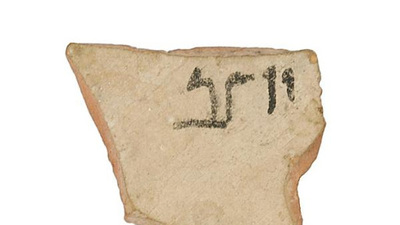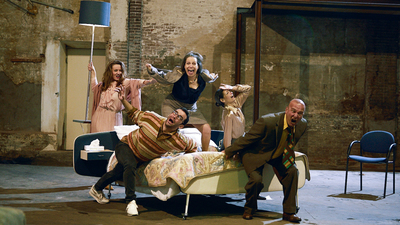Dear Friends, In May, 2017, Yael Valier, a student and contributor to the David Cardozo Think Tank, launched a remarkable play about the famous Disputation of Barcelona between the legendary Jewish scholar Nachmanides, also called Ramban (1194-1270) and a Jewish convert to Christianity, named Pablo Christiani, concerning the truth of Judaism and Christianity. This debate was held over a period of four days in Barcelona in front of King James I of Aragon in 1263.
This is by far the most famous disputation between Judaism and Christianity ever to take place. Nachmanides was victorious and was even rewarded by King James I but was ultimately forced by the Dominicans to leave Aragon (Spain). He subsequently settled in Israel. Nachmanides recorded, from memory, the full dispute.
In our days, Roy Doliner, art detective and author of the best-seller The Sistine Secrets with Benjamin Blech, wrote a play about the disputation called Divine Right.
Yael Valier, who had just launched Theater and Theology, her theater company in Jerusalem, produced this play in May 2017. The production became a huge success and was staged many times. More information about it can be found here.
Since the David Cardozo Academy and Theater and Theology sometimes collaborate and have many similar goals, I participated in a discussion about this production when it was staged for the first time at the historic Khan Theater. This was a great honor.
In 2020, Yael published a paper on her experience and insight concerning this play which was published by Emanuel University of Oradea’s theological journal Perichoresis in September.
No doubt this became a most important essay which reflects in many ways the David Cardozo Academy’s ideology and goals and also touches on my “Contemplative Autobiography”. We are therefore very thankful to Yael for allowing us to reproduce her essay in three parts.
Nathan Lopes Cardozo
Dramaturgical and Theological Issues Involved in Producing and Staging a Play in Jerusalem about the Disputation of Barcelona
Continued…
Both Hyam Maccoby’s play and Roy Doliner’s play make reference to the same historical event: King James’ removal of the Bishop of Gerona’s tongue and the subsequent pressure applied to the king by the pope in order to have him prove his loyalty to the Church, as the following quotations will show:
Hyam Maccoby’s The Disputation, Act I, Scene 2:
RAYMOND SHOWS A BOX
KING JAMES (admiring box). Nice, eh? The finest ebony wood from Majorca. (Opens box) My, my, the Bishop had a long tongue. Display it in the town square.
RAYMOND DE PENAFORTE. Your Majesty, I must speak openly.
KING JAMES. Please do.
RAYMOND DE PENAFORTE. Pope Urban is outraged.
KING JAMES. The Bishop of Gerona brought it upon himself. He should not have spoken openly against the King.
RAYMOND DE PENAFORTE. He spoke against your infidelities.
KING JAMES. Well he’s a mute bishop now, isn’t he?
RAYMOND DE PENAFORTE. His Holiness feels that the incident is further proof of your lack of support for the Church. He has recommended your excommunication.
KING JAMES. That would not be good.
RAYMOND DE PENAFORTE. I have been able to delay this while we seek calm. I do think that if the Pope felt that you had more of an interest in converting the Jews to Christianity, so that our Saviour may return, he would be willing to re-examine the penalty.
Hyam Maccoby’s The Disputation, Act II, Scene 4:
RAYMOND DE PENAFORTE TO NAHMANIDES:
The King’s position is on a knife edge. Powerful interests wish to dislodge him. His Holiness the Pope is supporting the King at present, but the outcome of the Disputation could affect his attitude. There is strong pressure for Jewish policy in Aragon to conform with that of France. If the King were removed, your position would be very precarious. We have to be able to say that we made at least some progress. We cannot appear weak.
Roy Doliner’s Divine Right, Act II, Scene 2:
In a private conversation, King James explains his position as if he were embroiled in a deadly game of chess:
KING. Master Moses, do you remember when you taught me the game of Chess? You said there was one secret, and one secret only, and that is: do whatever you must to protect your king. I’ve followed your rule all these years, and that is why I’m still King. You’ve heard the tale they tell about me and the former Bishop?
MOSES. No.
KING. You’ve heard.
MOSES. That rumor about cutting out his tongue?
KING. No rumor.
MOSES. Oh.
KING. Don’t look so shocked, my friend. It doesn’t befit a man of your years. He was going to have me excommunicated, a condition which makes it fairly difficult for a Catholic king to rule a Catholic country.
MOSES. So, you removed a Bishop to save the King. Where do I fit into this chess game of yours?
KING. Tactical defense. The Church is like that Moorish genie who wouldn’t go back in his bottle. Oh, it was easy to raise the banner of the Cross to rally the people, but now, now! This Inquisition, this damned religious furor! It’s re-arranged the entire board! Look at Louis; he doesn’t rule in France anymore – he bows to the Pope and his holy henchmen. Spain is their next target; this disputation is a test of my strength, not yours.
These quotations show that both Doliner and Maccoby found it important to stress upon their audiences the extreme pressure under which the monarch operated in the face of the Church’s power. This emphasis is important for audiences, even those living in relatively religious countries, who exist in a world where their choices as individuals are free, and who need to be exposed to the world of religion-as-dictatorship in order to understand the world of the play.
Apart from substantially sticking to the facts of the trial in order to remain faithful to history, one of the devices Doliner applies in order to maintain the historic tone of the play is the use of highly formal language in relevant court scenes throughout the production. Some of the language is taken straight from translations of Nahmanides’ report of events, and some is a pseudo-archaic language of Doliner’s own invention that works instantly to immerse viewers in the past, without the need for lengthy expository scene setting. Divine Right’s prologue, quoted below, is an extreme example of this technique, wherein Doliner uses pseudo-biblical language successfully at the very opening of the play in order to make the audience unconsciously aware of the epic nature of the debate and its place in the continuum of Jewish and Church history:
Prologue
LEVI: In the Beginning was the Spirit, and the Spirit was given Form, and Religion was created.
GUILLERMO: And from the sands of the Sinai came forth Judaism, and Judaism begat Christianity, and together they begat Islam.
SCHLOMO: And the Kingdom of Israel gave way to the Holy Roman Empire which in turn gave way to the Moorish Empire. And the Religious Powers strove together, each against the other.
RAMON: And Christianity begat the Church which begat the Holy Orders: the Dominicans in their princely white robes and the Franciscans in their common grey robes. And the two orders strove together, each against the other.
GERSHON: And the Church begat also Dogma and Dogma begat Heresy and Heresy begat – the Inquisition. And Terror and Suffering covered the face of Europe.
TOMAS: And during these Dark Ages, in the middle of the ill-favored Thirteenth Century, all these forces were brought together, to a palace in Barcelona.
JEW (YITZCHAK): And there, for four days, they all strove together, each against the other.
End of Prologue
In choosing which points of the original debate to feature in their plays, and which to cut or substitute, both Maccoby and Doliner had to keep in mind what would be accessible to the average viewer. Maccoby addresses the problem by cutting down heavily on substance, though he, like Doliner, does make reference to Nahmanides’ own report of the debate for material. Maccoby’s debate scenes are shorter and simpler than Doliner’s, and the details of the debate are curtailed, with points of dispute rarely going through more than a few iterations of questioning and answering. Furthermore, in Maccoby’s play, issues are debated more as theoretical positions, with scant reference to sources, rather than as the result of the examination of the minutiae of Scripture or the Jewish Oral Tradition. Doliner’s play gives the audience a taste of the convoluted nature of the debate and the erudition and preparedness of the interlocutors in a series of sustained bouts in which sources in Scripture and the oral tradition are constantly quoted.
When quoting sources, Doliner had to decide how anachronistic he could allow himself to be. The division of the Bible into verses within chapters was only imposed on the Hebrew Bible by the Catholic Church in 1571. However, modern audiences are used to hearing chapter and verse quoted. In response to this, Doliner uses verse and chapter numbers in his play. Maccoby avoided the anachronism by referring only to ‘the Talmud’ or ‘the Bible’.
In Jerusalem, I would not be able to get away with vague references to ‘the Talmud’ in situations where, in fact, the text debated is not included in the Talmud, but rather lies in other books in the oral tradition. In the first read-through of Divine Right with the actors, three of the actors immediately spotted and objected to an incorrect quotation! Doliner had written that something was from ‘Talmud, Commentary on Hosea, 518.’ This was perfectly acceptable and sufficient for the general audiences for whom Doliner was originally writing. However, a Jerusalem audience holds viewers who would immediately spot, and be bothered by, the inconsistency. The actors in my cast recognized the quote as coming from the Yalkut Shimoni, a non-Talmudic compilation of aggadic writings on the books of the Bible, and immediately went looking for the exact source, so as to quote correctly on stage. Doliner approved their request to change the line, and compromised with ‘Yalkut Parables on Hosea, 518’. (I will address the peculiarities of my cast in the Theological Issues section, below.)
Nahmanides’ own report of the debate, polemical in nature, provides much natural drama in the form of Nahmanides’ outrageous, daring (or foolhardy), and shocking pronouncements. Doliner makes full use of these in his play, and I will discuss the difficulty of staging them effectively below. Maccoby chose to do so much less frequently, often leaving out Nahmanides’ scandalous pronouncements. Perhaps Maccoby feared that no audience could accept the authenticity of Nahmanides’ more outrageous assertions in a hostile court – a reasonable assumption. Doliner included them – another fact that encouraged me to produce his play. Though I suspected that a percentage of my audience would doubt the veracity of these episodes, I also knew that they would relish them. Additionally, the format of Theater and Theology always includes a talk-back session after the performance, in which a Jewish or Christian scholar discusses the play and answers questions. This allows my audiences to voice their doubts and to have them be confirmed or denied. And indeed, most nights, a member of the audience asked Doliner (who was always present) and the scholar if Nahmanides could possibly have said all those outrageous things. The talkback format gives me more creative freedom as a director, since I know that historical inaccuracies and anachronisms will be addressed by the end of the evening.
Below, I have reproduced one passage from each play that illustrates Maccoby’s and Doliner’s different methods of handling both source quotations and Nahmanides’ self-reported daring assertions, in this case his assertions about the difference between the Messiah’s being born and his ‘coming’.
Hyam Maccoby’s The Disputation, Act I, Scene 6:
PABLO CHRISTIANI. Your Majesty, let me cite a passage not from the Old Testament but from the Talmud. The Talmud says, ‘At the time when the Temple was destroyed, the Messiah was born.’ …Let me put the question directly to Rabbi Moses. Why are the Jews waiting for the Messiah when their own Talmud tells them that He came twelve hundred years ago?
KING JAMES. What have you to say to this, Rabbi Moses?
MOSES BEN NACHMAN. Your Majesty, with respect to Brother Pablo, the Talmud does not say that the Messiah came at the time of the destruction of the Temple. It only says that He was born then.
KING JAMES. That’s more or less the same, no?
MOSES BEN NACHMAN. No, your Majesty. When Moses was born he did not immediately lead the children of Israel out of Egypt. That was hardly a task for a new born babe. The event itself took place eighty years later. Similarly, the date of the Messiah’s birth is by no
means the same as the date of His coming.
KING JAMES. And when will be His coming?
MOSES BEN NACHMAN. When he leads the Jews back to the Holy Land. That hasn’t happened yet so he hasn’t yet come.
Roy Doliner’s Divine Right, Act II, Scene 2:
PABLO: … Behold, I quote from the Commentaries on Lamentations, Chapter I, paragraph 57, where the story indicates that the Messiah was born at the same moment that the Holy Temple was destroyed.
MOSES: Paragraph 57? This is truly preposterous! Out of all the laws, the wisdom of the Talmud, you choose a parable, an obscure legend which I don’t even believe word for word!
PABLO: I, I am preposterous! See how this Jewish Master denies the holy writings of his own people!
MOSES: Yes! Yes, I do! These are writings of men―wise men, holy men, but men nonetheless―and I am not bound to swallow their every word as Gospel truth.
PABLO: But here, word for word, your precious Sages say the Messiah has come!
KING: Answer the question.
MOSES: As you wish. The Sages in this legend do not say that the Messiah has come, but only that he was born. On the day that my namesake, Moses, was born – peace be with him – he was not yet our deliverer; he had not yet come. It was not until he came to Pharaoh by the command of God and said, ‘Thus saith the Lord: Let My People go!’ – then he had come. David was born a mere shepherd boy, but when Samuel anointed him King of Israel, then he had come. And so it is with the Messiah. Only on the day when the prophet Elijah anoints him will he rightly be called ‘Messiah’, and not before. And on the great day when he goes to Rome, to your Pope by the command of God and says: ‘Thus saith the Lord, Let My People go!’, then – then I will be the first to proclaim to the world: ‘Yes, it is true! Yes, at last, it is the Messiah! Behold, the Messiah has come!’
From the quotations above, it is clear that Doliner was willing to rely heavily on Nahmanides’ report and to quote it, where appropriate, in its complexity and daring. This makes for excellent theater!
In Maccoby’s play, Nahmanides is always the cleverer combatant, and the king assures Nahmanides before the debate begins, that whatever the result, he guarantees safety for Nahmanides’ family and community, hence destroying in advance any tension the audience might have experienced in their fear for the fate of Nahmanides. Doliner maintains drama by portraying the high level of debate on both sides, thereby generating tension in viewers who do not know in advance whether Nahmanides will win or lose any particular battle within the war. In Act I of Doliner’s play, Nahmanides loses the first day’s debate, whereupon his family gathers to lick its wounds and prepare for the next day’s bout. This is excellent dramatic technique, as well as an effective vehicle for accurately portraying the Church as a formidable opponent – not just because of its power, but also thanks to its erudition.
Doliner also introduces and maintains drama by featuring the rivalry of the Franciscans and the Dominicans in his play. Maccoby makes brief mention of this rivalry, but Divine Right uses it extensively to advance a more nuanced understanding of the Church in the 13th century. Doliner wanted to show that there was a history of cooperation and shared scholarship between Jews and Christians, and that there existed voices in the Church that called for a genuine search for truth. (This is consistent with Doliner’s position and ideals as a lecturer for the Center for Jewish-Christian Understanding and Cooperation in Jerusalem.) Doliner uses the character of a Franciscan monk, whom he calls Tomas, as the mouthpiece for this stance. Tomas’ character arc has him begin the play as equally contemptuous of Nahmanides as all the other friars, and end the play with deep respect for Nahmanides. In Tomas’ words, ‘How can I hear a man speak like that and call it ignorance? How can I witness faith like that and call it arrogance or blasphemy?’ Doliner based the character of Tomas on Brother Peire of Gerona, who made one comment on Nahmanides’ behalf in the original Disputation, according to Nahmanides’ own report. Brother Peire hastily withdrew his support immediately upon Nahmanides’ declaration that his comment supported the Jewish claim. Maccoby, in Judaism on Trial, explains this incident in a footnote as follows, ‘Fray Peire de Gerona: He was of the Franciscan Order, and some have seen in his intervention here on N.’s side an indication of the rivalry between Franciscans and Dominicans… Later the same Peire de Gerona took a leading part in the move to suspend the Disputation… and again, he hastily withdrew, as here, when his support for N. became embarrassing’ (Maccoby 1982: 108). Doliner changed Brother Peire’s name to Tomas for the sake of any audience members who could catch the reference to ‘Doubting Thomas’, the skeptical apostle. In Doliner’s play, Tomas earns the name by refusing to sustain a position that contradicts the evidence of his own eyes: the fact that Nahmanides is a respectworthy man. The developing story makes it clear, too, that Nahmanides returns Tomas’ respect, and it is certainly Doliner’s ulterior motive in developing this story arc to show that Christians and Jews can live with mutual respect and a shared desire to learn from each other.
Doliner also uses the tension between the Franciscan and Dominican friars to further illustrate the power and danger of the Inquisition, not only vis-à-vis Jews, but chiefly vis-à-vis Christian heretics. In Act II, Scene 4, in a scene where Nahmanides becomes weak from the stress of the trial, we see the following exchange between the Franciscan Father Tomas, and Pablo Christiani:
TOMAS: Your Majesty – perhaps Master Moses would like to rest, after all.
PABLO: Perhaps Father Tomas would like to take his place. Take care, for the Inquisition is here to judge not only the Jews, but Christian souls as well. Now, what were you saying?
TOMAS: Nothing… nothing at all.
PABLO: As I thought. Master Moses, can you answer? Or do you concede?
Compare this scene to a similar one, written by Jean Anouilh in his play L’alouette, about Joan of Arc. Like Doliner, Anouilh must show his audience, without resorting to boring exposition, that the Church is all-powerful and keeps rigid discipline in its own ranks. In a scene in which L’Advenu shows some sympathy for Joan’s defense against the Church, L’Inquisiteur snaps back, ‘Silence, Frere L’Advenu, vous di-je! Ou il faudra que je m’occupe aussi de votre cas’ (Anouilh 1972: 128). As in Doliner’s play, this threat does its work of silencing the offender. Both playwrights effectively use this elegant device, basing their writing on history while allowing themselves to imagine a scene designed to bring understanding, if not literal reality, to the audience.
The more balanced portrayal of the Church provided by the character of Tomas in Divine Right was a further draw for me as a director. Despite his need to show the puissance and threat of the Church, Doliner succeeded in avoiding a crude ‘Defendant good, Church bad!’ message in which other playwrights indulge. It is always easy to make fun of the Church, as Jerome Lawrence and Robert E. Lee, for example, do in their 1955 play Inherit the Wind about the famous 1925 Scopes ‘Monkey Trial’, convened to try John Scopes for teaching evolution to his high school science class. In its zeal to apply its metaphor against McCarthyism, the play distorts history so much as to do the citizens of Tennessee and the Church a disservice. Lawrence and Lee’s play makes excellent theater, but the Church pays heavily in collateral damage. Divine Right, on the other hand, avoids this playwright’s trap by making excellent theater without resorting to the easy besmirching of an entire institution—a much more difficult accomplishment.
To be continued by Part Three, the final part.
This publication was made possible with the support of the Louis and Dina Van de Kamp Foundation, August 2020.





